6.00 Handout, Lecture 3
(Not intended to make sense outside of lecture)
Fall 2008
#Find the square root of a perfect square
x = 16
ans = 0
while ans*ans <= x:
ans = ans + 1
print ans
ans = 0
if x >= 0:
while ans*ans < x:
ans = ans + 1
print 'ans =', ans
if ans*ans != x:
print x, 'is not a perfect square'
else: print ans
else: print x, 'is a negative number'
x = 10
i = 1
while(i
6.00 Handout, Lecture 4
(Not intended to make sense outside of lecture)
#example code for finding square roots
x = 16
ans = 0
if x >= 0:
while ans*ans < x:
ans = ans + 1
print 'ans =', ans
if ans*ans != x:
print x, 'is not a perfect square'
else: print ans
else: print x, 'is a negative number'
def sqrt(x):
"""Returns the square root of x, if x is a perfect square.
Prints an error message and returns None otherwise"""
ans = 0
if x >= 0:
while ans*ans < x: ans = ans + 1
if ans*ans != x:
print x, 'is not a perfect square'
return None
else: return ans
else:
print x, 'is a negative number'
return None
def f(x):
x = x + 1
return x
x = 3
z = f(x)
print x
print z
def solve(numLegs, numHeads):
for numChicks in range(0, numHeads + 1):
numPigs = numHeads - numChicks
totLegs = 4*numPigs + 2*numChicks
if totLegs == numLegs:
return (numPigs, numChicks)
return (None, None)
def barnYard():
heads = int(raw_input('Enter number of heads: '))
legs = int(raw_input('Enter number of legs: '))
pigs, chickens = solve(legs, heads)
if pigs == None:
print 'There is no solution'
else:
print 'Number of pigs:', pigs
print 'Number of chickens:', chickens
�
def solve1(numLegs, numHeads):
for numSpiders in range(0, numHeads + 1):
for numChicks in range(0, numHeads - numSpiders + 1):
numPigs = numHeads - numChicks - numSpiders
totLegs = 4*numPigs + 2*numChicks + 8*numSpiders
if totLegs == numLegs:
return (numPigs, numChicks, numSpiders)
return (None, None, None)
def barnYard1():
heads = int(raw_input('Enter number of heads: '))
legs = int(raw_input('Enter number of legs: '))
pigs, chickens, spiders = solve1(legs, heads)
if pigs == None:
print 'There is no solution'
else:
print 'Number of pigs:', pigs
print 'Number of chickens:', chickens
print 'Number of spiders:', spiders
def solve2(numLegs, numHeads):
solutionFound = False
for numSpiders in range(0, numHeads + 1):
for numChicks in range(0, numHeads - numSpiders + 1):
numPigs = numHeads - numChicks - numSpiders
totLegs = 4*numPigs + 2*numChicks + 8*numSpiders
if totLegs == numLegs:
print 'Number of pigs: ' + str(numPigs) + ',',
print 'Number of chickens: '+str(numChicks)+',',
print 'Number of spiders:', numSpiders
solutionFound = True
if not solutionFound: print 'There is no solution.'
def isPalindrome(s):
"""Returns True if s is a palindrome and False otherwise"""
if len(s) <= 1: return True
else: return s[0] == s[-1] and isPalindrome(s[1:-1])
def fib(x):
"""Return fibonacci of x, where x is a non-negative int"""
if x == 0 or x == 1: return 1
else: return fib(x-1) + fib(x-2)
�
6.00 Handout, Lecture 5
(Not intended to make sense outside of lecture)
def squareRootBi(x, epsilon):
"""Return y s.t. y*y is within epsilon of x"""
assert epsilon > 0, 'epsilon must be postive, not' + str(epsilon)
low = 0
high = max(x, 1)
guess = (low + high)/2.0
ctr = 1
while abs(guess**2 - x) > epsilon and ctr <= 100:
#print 'low:', low, 'high:', high, 'guess:', guess
if guess**2 < x:
low = guess
else:
high = guess
guess = (low + high)/2.0
ctr += 1
assert ctr <= 100, 'Iteration count exceeded'
print 'Bi method. Num. iterations:', ctr, 'Estimate:', guess
return guess
def squareRootNR(x, epsilon):
"""Return y s.t. y*y is within epsilon of x"""
assert epsilon > 0, 'epsilon must be postive, not' + str(epsilon)
x = float(x)
guess = x/2.0
guess = 0.001
diff = guess**2 - x
ctr = 1
while abs(diff) > epsilon and ctr <= 100:
#print 'Error:', diff, 'guess:', guess
guess = guess - diff/(2.0*guess)
diff = guess**2 - x
ctr += 1
assert ctr <= 100, 'Iteration count exceeded'
print 'NR method. Num. iterations:', ctr, 'Estimate:', guess
return guess
�
6.00 Handout, Lecture 6
(Not intended to make sense outside of lecture)
def squareRootBi(x, epsilon):
"""Assumes x >= 0 and epsilon > 0
Return y s.t. y*y is within epsilon of x"""
assert x >= 0, 'x must be non-negative, not' + str(x)
assert epsilon > 0, 'epsilon must be positive, not' + str(epsilon)
low = 0
high = x
guess = (low + high)/2.0
ctr = 1
while abs(guess**2 - x) > epsilon and ctr <= 100:
#print 'low:', low, 'high:', high, 'guess:', guess
if guess**2 < x:
low = guess
else:
high = guess
guess = (low + high)/2.0
ctr += 1
assert ctr <= 100, 'Iteration count exceeded'
print 'Bi method. Num. iterations:', ctr, 'Estimate:', guess
return guess
-------------------------------------
def squareRootNR(x, epsilon):
"""Assumes x >= 0 and epsilon > 0
Return y s.t. y*y is within epsilon of x"""
assert x >= 0, 'x must be non-negative, not' + str(x)
assert epsilon > 0, 'epsilon must be positive, not' + str(epsilon)
x = float(x)
guess = x/2.0
guess = 0.001
diff = guess**2 - x
ctr = 1
while abs(diff) > epsilon and ctr <= 100:
#print 'Error:', diff, 'guess:', guess
guess = guess - diff/(2.0*guess)
diff = guess**2 - x
ctr += 1
assert ctr <= 100, 'Iteration count exceeded'
print 'NR method. Num. iterations:', ctr, 'Estimate:', guess
return guess
�
Techs = ['MIT', 'Cal Tech']
print Techs
Ivys = ['Harvard', 'Yale', 'Brown']
print Ivys
Univs = []
Univs.append(Techs)
print Univs
Univs.append(Ivys)
raw_input()
print Univs
raw_input()
for e in Univs:
print e
for c in e: print c
raw_input()
Univs = Techs + Ivys
print Univs
raw_input()
Ivys.remove('Harvard')
print Univs
Ivys[1] = -1
print Ivys
L1 = [1, 2, 3]
L2 = L1
L1[0] = 4
print L2
def f(L):
L[0] = 4
L1 = [1,2,3]
L2 = [1,2,3]
L3 = L1
print L1 == L2
f(L1)
print L1 == L2
print L1
print L2
print L3
EtoF = {'one': 'un', 'soccer': 'football'}
print EtoF['soccer']
print EtoF[0]
print EtoF
NtoS = {1: 'one', 2: 'two', 'one': 1, 'two': 2}
print NtoS.keys()
print NtoS.keys
del NtoS['one']
print NtoS
L = [['un', 'one'], ['deux', 'two']]
def keySearch(L, k):
if elem[0] == k: return elem[1]
for elem in L:
return None
print keySearch(L, 'deux')
L1 = [1,2,3]
L2 = L1[:] #makes a copy of L1
L = [['un', 'one'], ['deux', 'two']]
def keySearch(L, k):
for elem in L:
if elem[0] == k:
return elem[1]
return None
�
Lecture 7 handout
6.00 Fall Term 2008
import math
#Get base
inputOK = False
while not inputOK:
base = input('Enter base: ')
if type(base) == type(1.0): inputOK = True
else: print('Error. Base must be floating point number.')
#Get Height
inputOK = False
while not inputOK:
height = input('Enter height: ')
if type(height) == type(1.0): inputOK = True
else: print('Error. Height must be floating point number.')
hyp = math.sqrt(base*base + height*height)
print 'Base: '+str(base)+',height: '+str(height)+', hyp: '+
str(hyp)
def getFloat(requestMsg, errorMsg):
inputOK = False
while not inputOK:
val = input(requestMsg)
if type(val) == type(1.0): inputOK = True
else: print(errorMsg)
return val
base = getFloat('Enter base: ', 'Error: base must be a float')
height = getFloat('Enter height: ', 'Error: height must be a
float')
hyp = math.sqrt(base*base + height*height)
print 'Base: ' + str(base) + ',height: ' + str(height) + ', hyp:
' + str(hyp)
def exp1(a,b):
ans = 1
while (b>0):
ans *= a
b -= 1
return ans
def exp2(a,b):
if b == 1:
return a
else: return a*exp2(a,b-1)
def exp3(a,b):
�
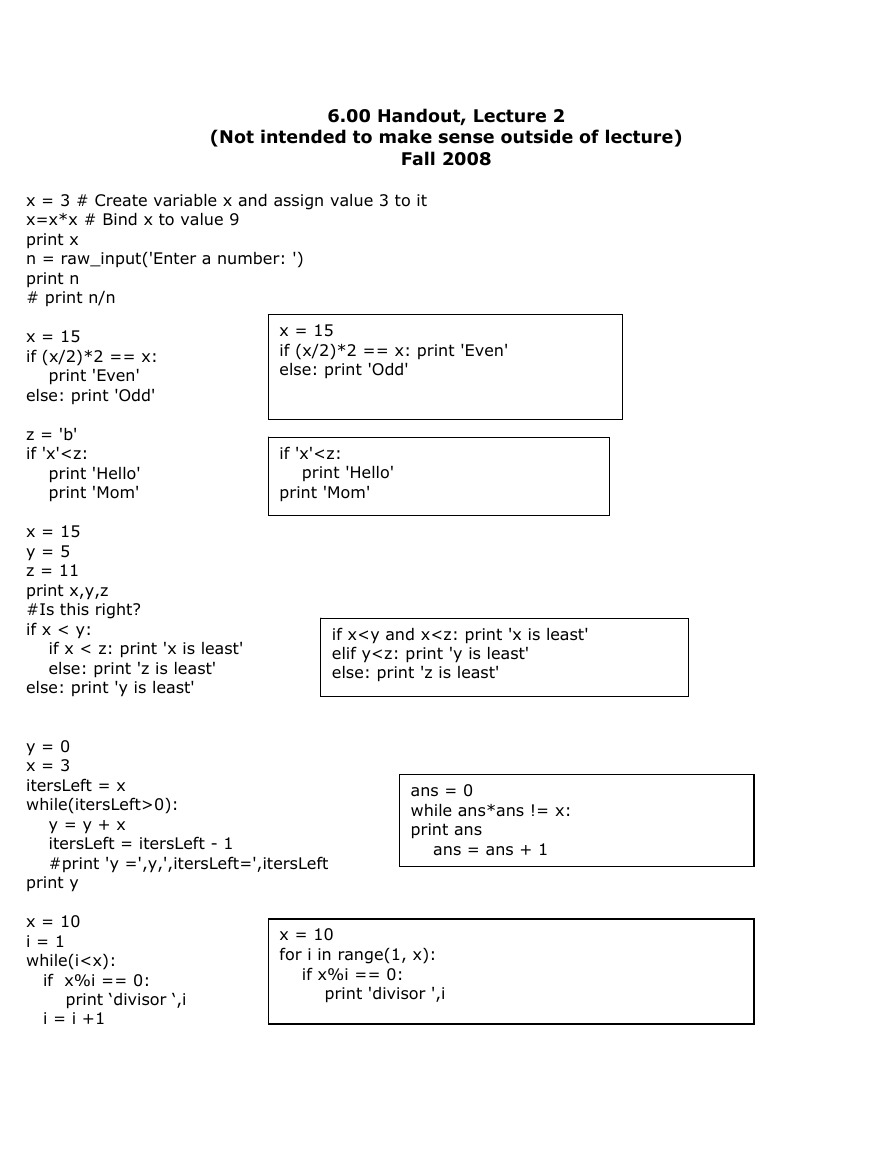
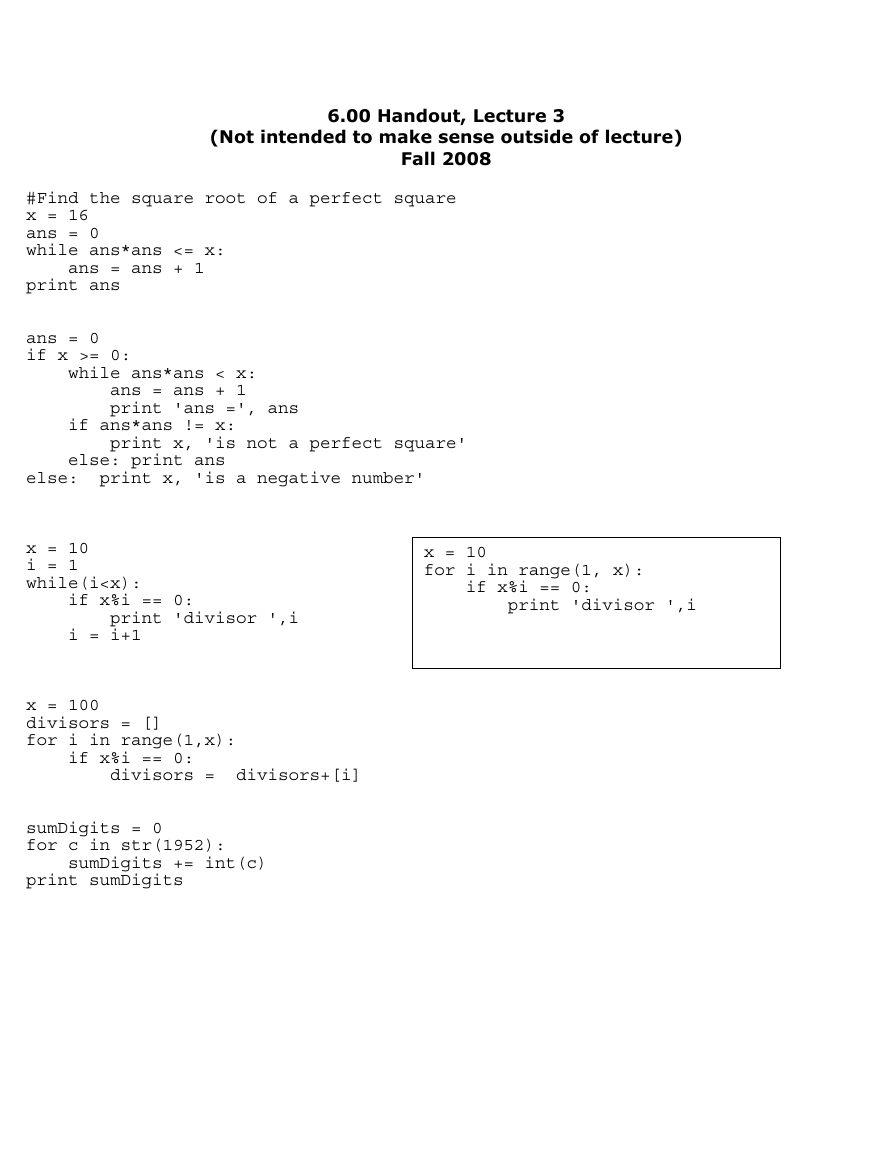
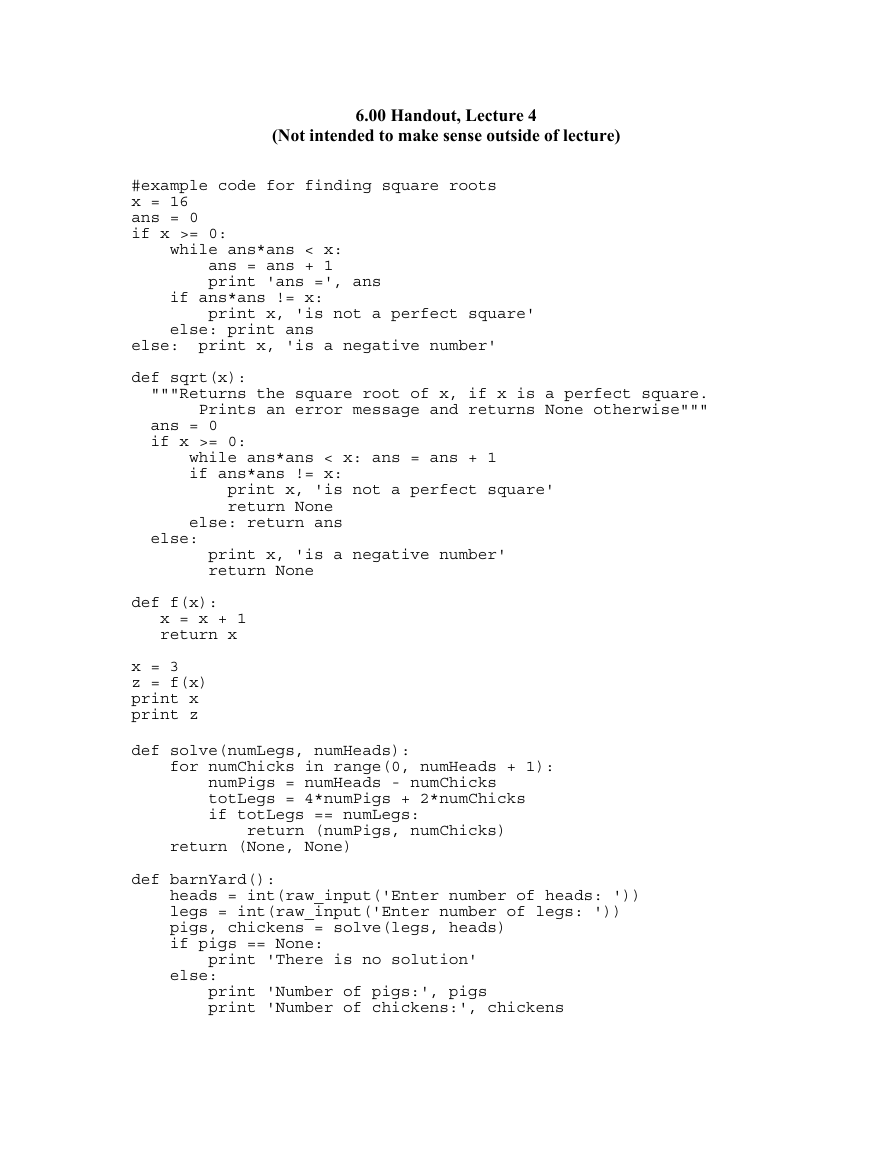
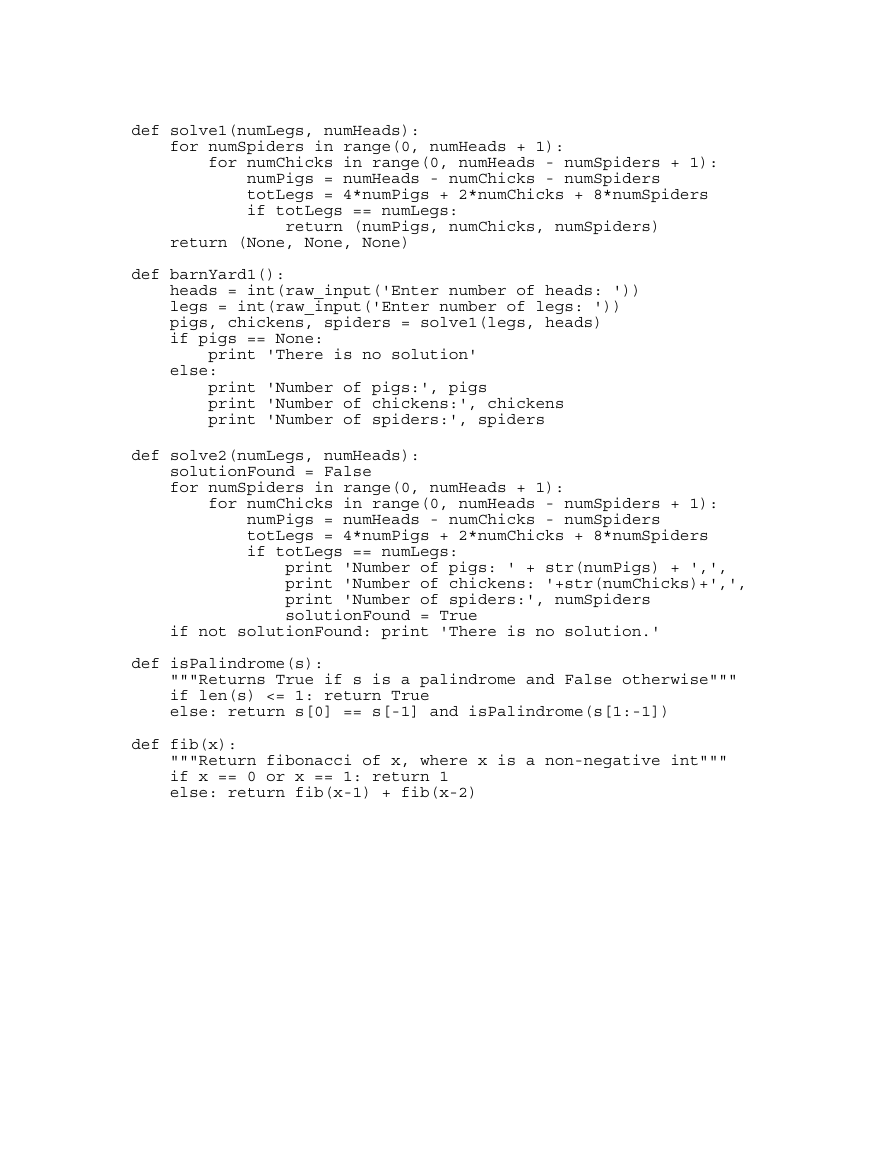
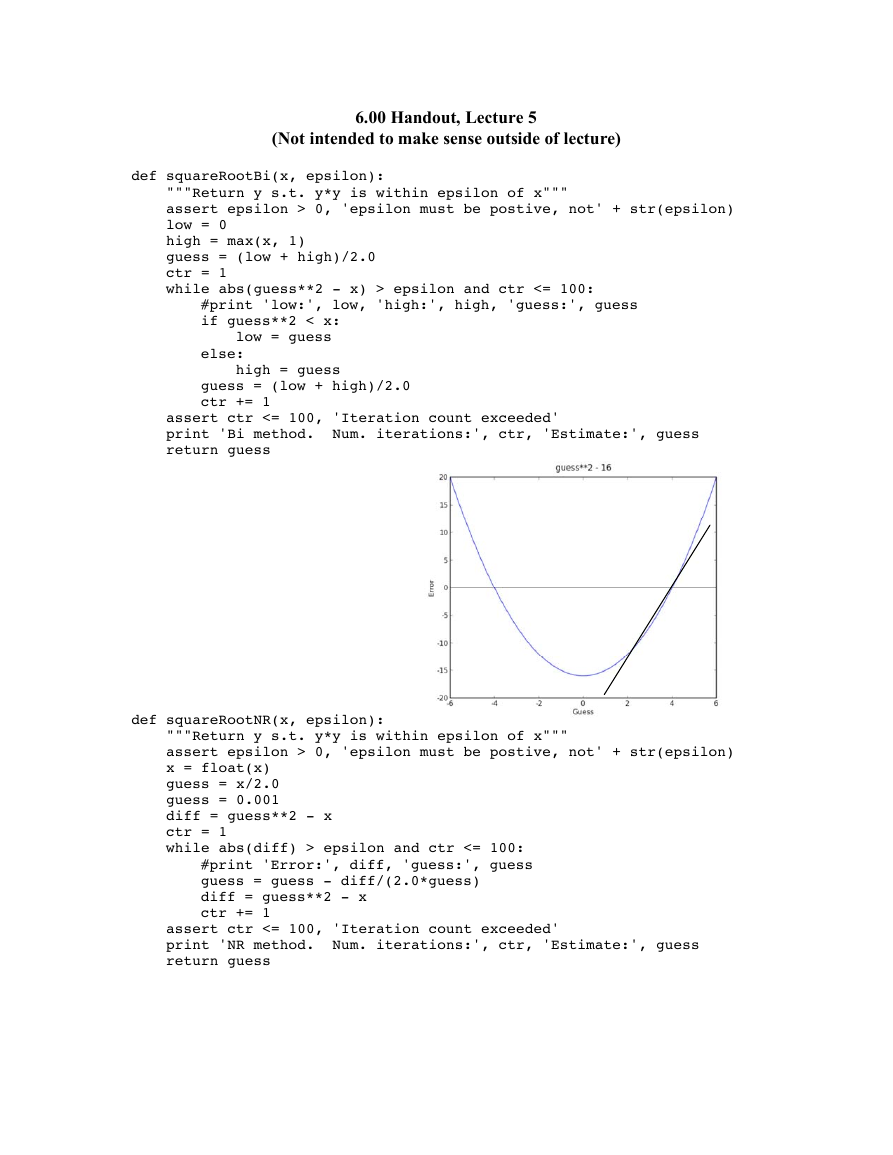
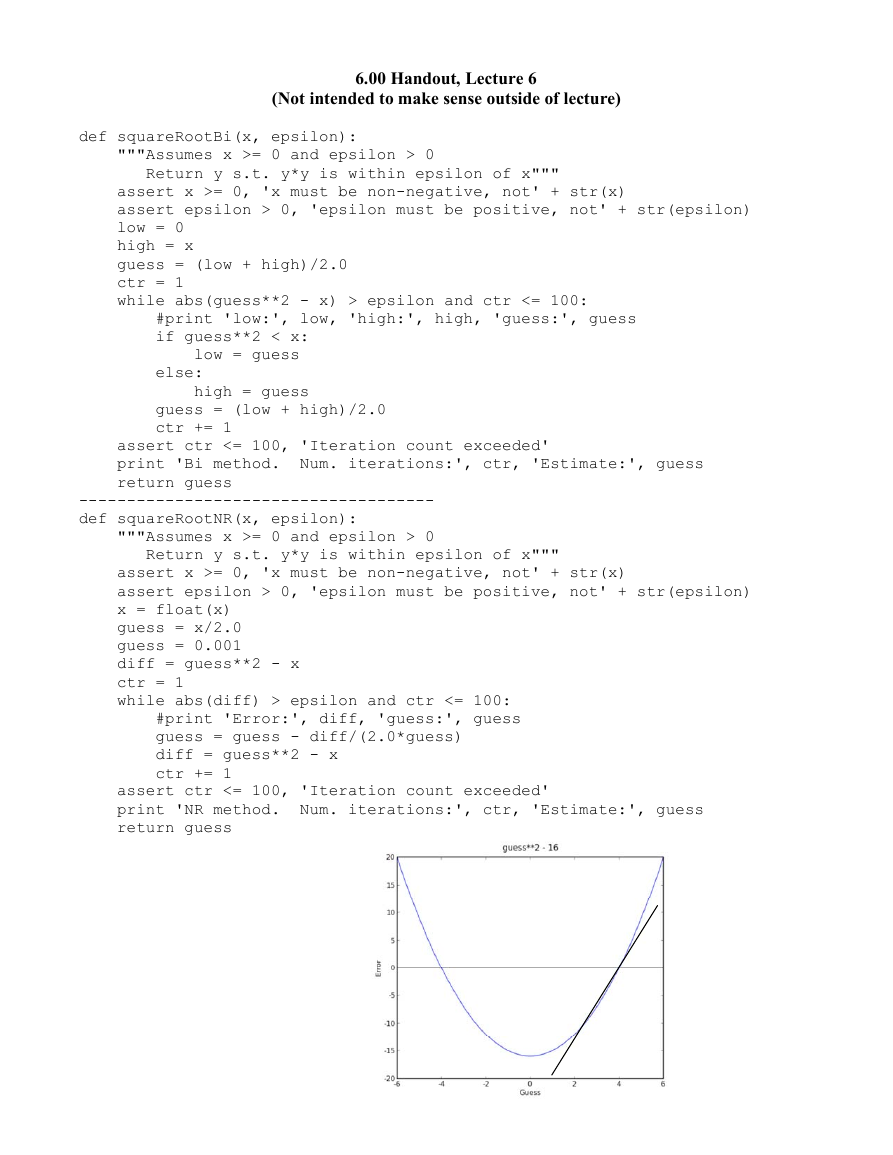
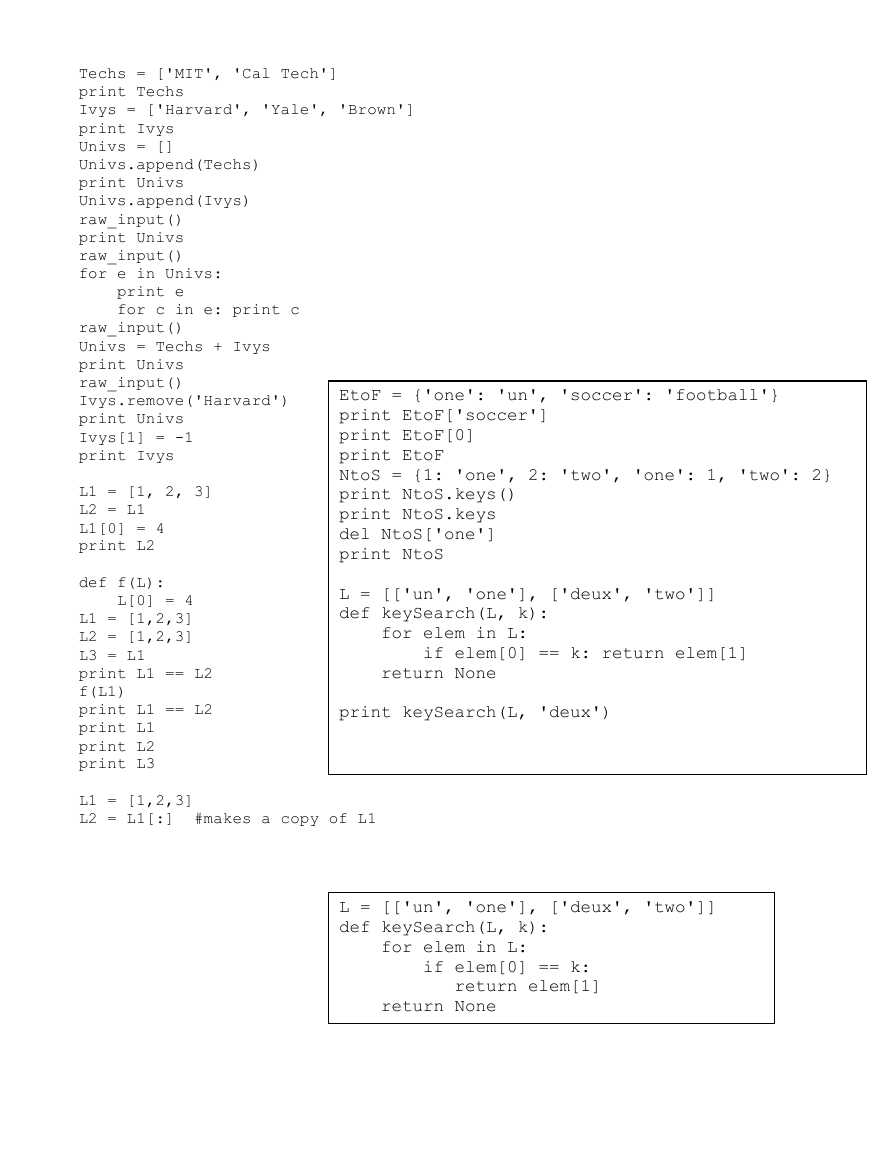
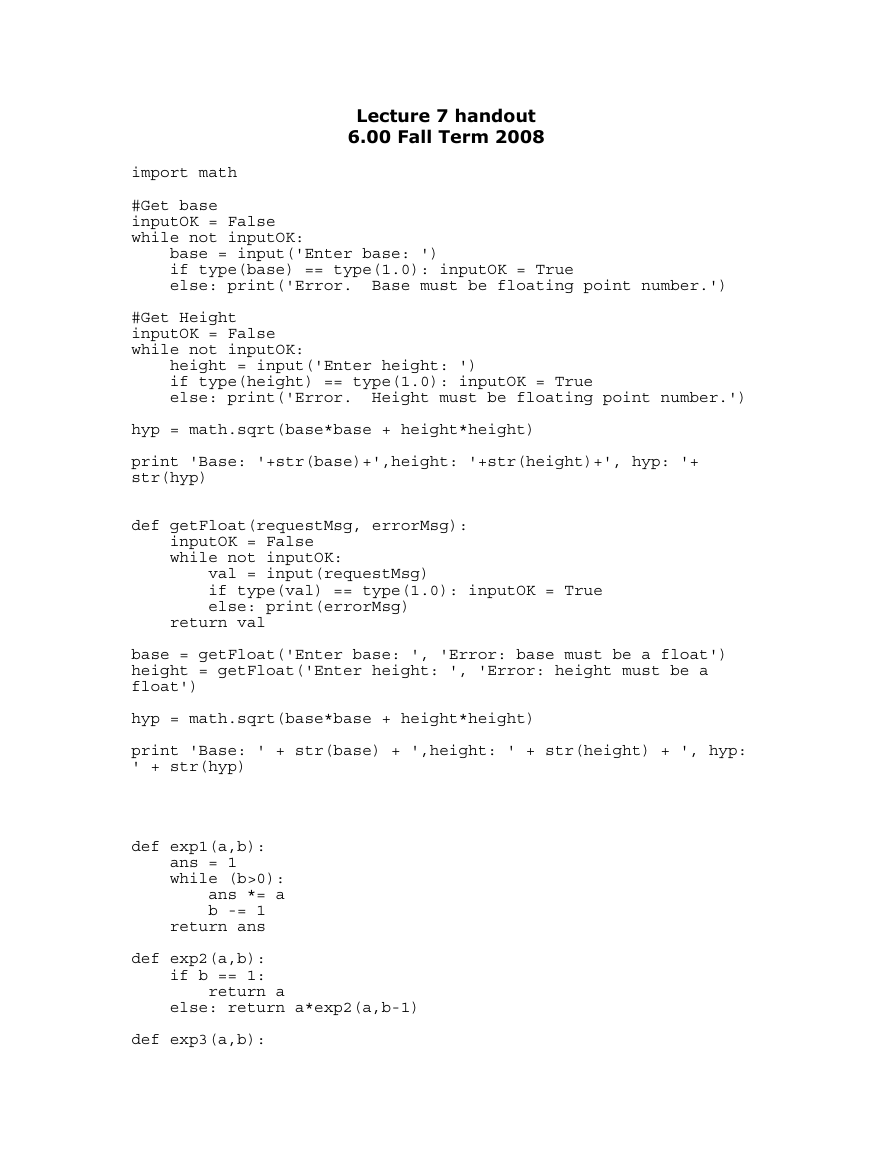








 2023年江西萍乡中考道德与法治真题及答案.doc
2023年江西萍乡中考道德与法治真题及答案.doc 2012年重庆南川中考生物真题及答案.doc
2012年重庆南川中考生物真题及答案.doc 2013年江西师范大学地理学综合及文艺理论基础考研真题.doc
2013年江西师范大学地理学综合及文艺理论基础考研真题.doc 2020年四川甘孜小升初语文真题及答案I卷.doc
2020年四川甘孜小升初语文真题及答案I卷.doc 2020年注册岩土工程师专业基础考试真题及答案.doc
2020年注册岩土工程师专业基础考试真题及答案.doc 2023-2024学年福建省厦门市九年级上学期数学月考试题及答案.doc
2023-2024学年福建省厦门市九年级上学期数学月考试题及答案.doc 2021-2022学年辽宁省沈阳市大东区九年级上学期语文期末试题及答案.doc
2021-2022学年辽宁省沈阳市大东区九年级上学期语文期末试题及答案.doc 2022-2023学年北京东城区初三第一学期物理期末试卷及答案.doc
2022-2023学年北京东城区初三第一学期物理期末试卷及答案.doc 2018上半年江西教师资格初中地理学科知识与教学能力真题及答案.doc
2018上半年江西教师资格初中地理学科知识与教学能力真题及答案.doc 2012年河北国家公务员申论考试真题及答案-省级.doc
2012年河北国家公务员申论考试真题及答案-省级.doc 2020-2021学年江苏省扬州市江都区邵樊片九年级上学期数学第一次质量检测试题及答案.doc
2020-2021学年江苏省扬州市江都区邵樊片九年级上学期数学第一次质量检测试题及答案.doc 2022下半年黑龙江教师资格证中学综合素质真题及答案.doc
2022下半年黑龙江教师资格证中学综合素质真题及答案.doc